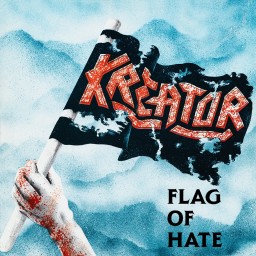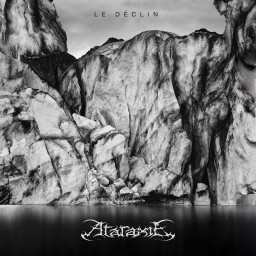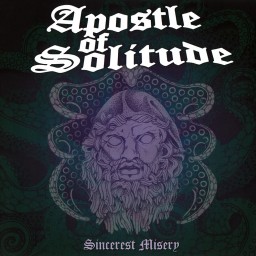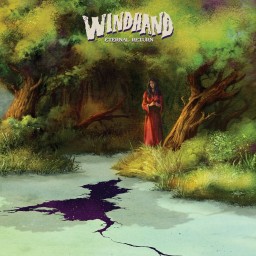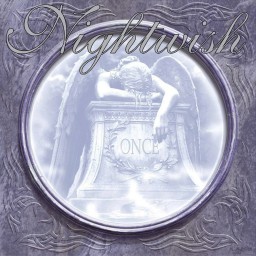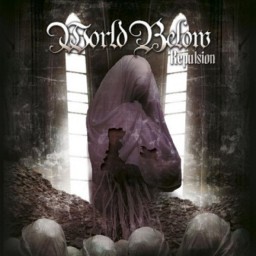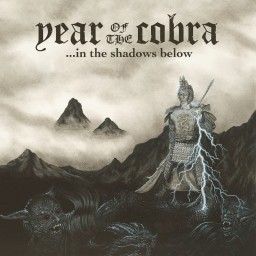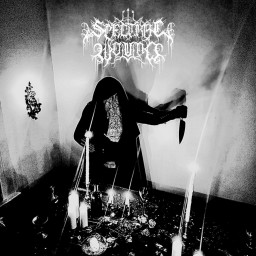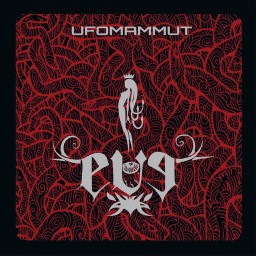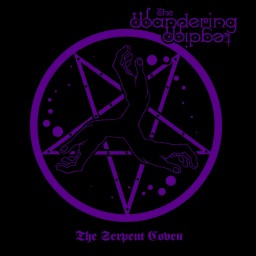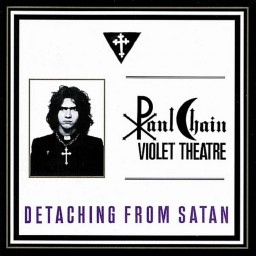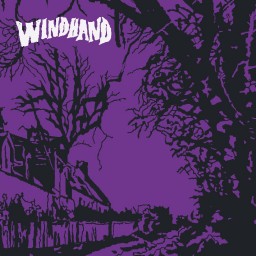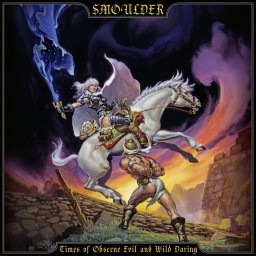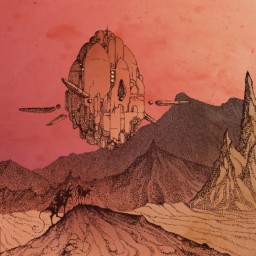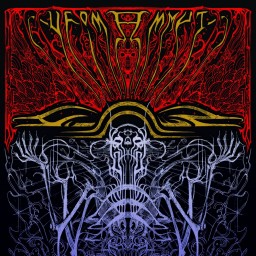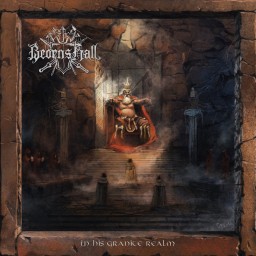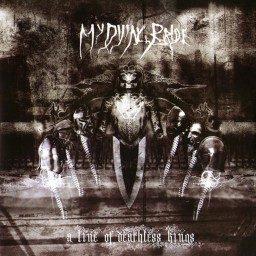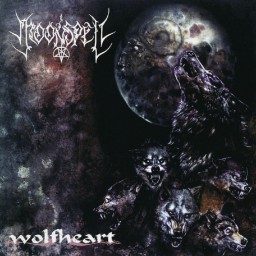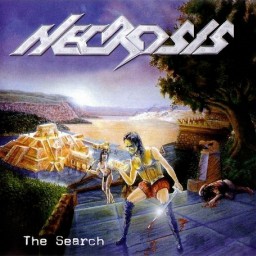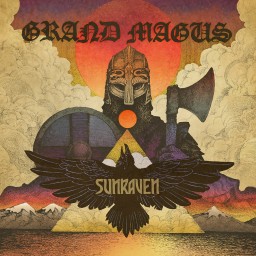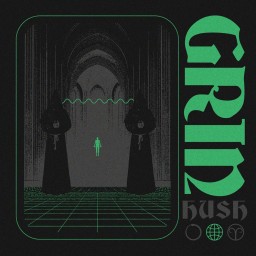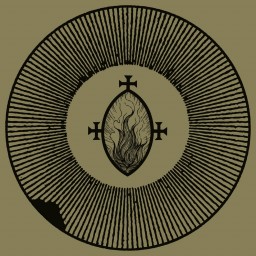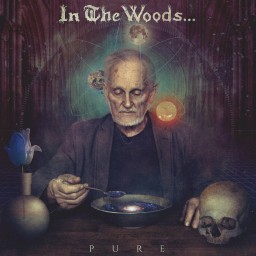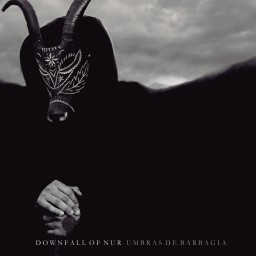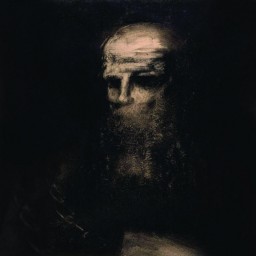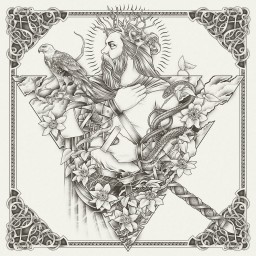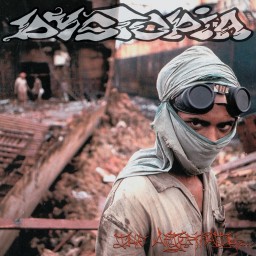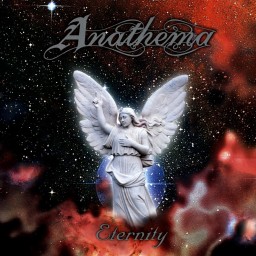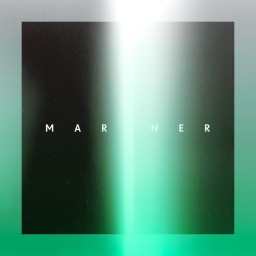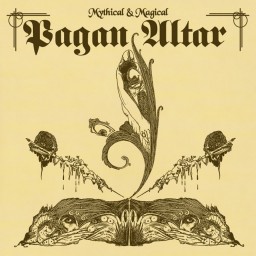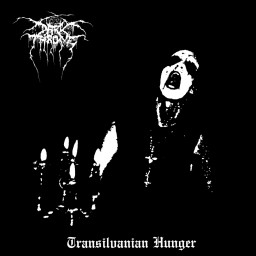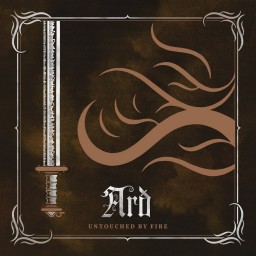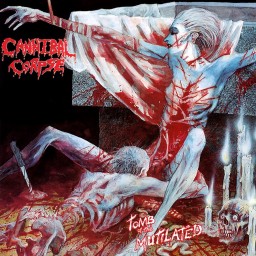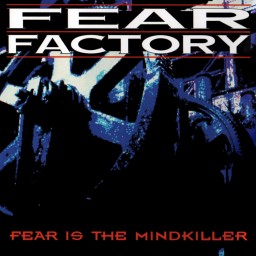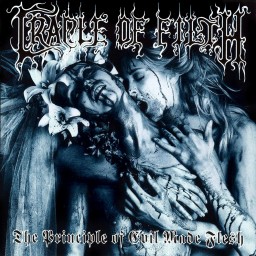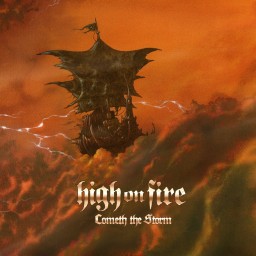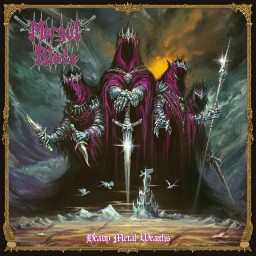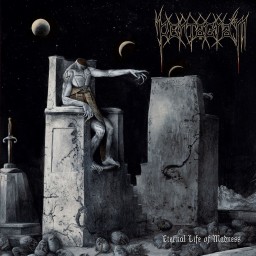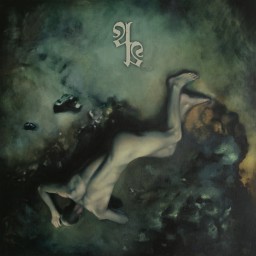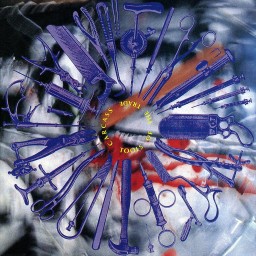Sonny's Reviews
Released shortly after the murderous Pleasure To Kill, this three-track EP encapsulates Kreator in a blissful 18-minute riff fest. It opens with a reworking of "Flag of Hate" from the debut album, Endless Pain, which illustrates how far the band had already come, this version being much tighter, faster and more aggressive, with the increased production values certainly helping massively on that front. The other two tracks, "Take Their Lives" and "Awakening of the Gods" are longer affairs which see the band in a more expansive mood than the straight-ahead, charging neck-wrenching of "Pleasure To Kill". The songwriting on these two tracks sees the band maturing and starting to move in the direction that would culminate with Coma of Souls, unafraid now to revert to slower tempos at times and to exhibit a lot more control over their impulse to just let rip, so that when they do, I think it is far more effective in this more controlled environment. Of course this increasingly professional and mature evolution comes at a price, with the sheer exuberance and brutal aggression of their early material, particularly Pleasure To Kill, being held in check here. Now, I am sure there are plenty of fans who lamented this direction, but surely Kreator couldn't just keep ploughing the same ultra-violent furrow ad nauseum and needed to display some kind of musical development by this point. No matter what came after, PTK would always still be there, so why would they need to keep remaking it?
Anyway, the two longer tracks see Kreator expanding the scope of their songwriting, possibly influenced by albums like Metallica's Ride the Lightning or To Mega Therion. "Take Their Lives" kicks off at a more measured tempo than we had come to expect from Kreator with a chugging riff that is afforded a nice sharp edge by the production and which accompanies Mille's bile-spitting, barked vocals perfectly, before it kicks up a gear and Mille unleashes a shred-tastic Kerry King-on-steroids guitar solo. A breathing space is then allowed for as the trio hit the eye of the storm and build anticipation with a jagged guitar line before letting it fly once more while Mille tortures another howling solo from his six-stringer. The final track, "Awakening of the Gods" is one of my favourite Kreator tracks, it has several riffs that just go so hard it's unreal and the Slayer-esque solos are devastating slashes of sonic thuggery that should carry a health warning.
I may have gone overboard and made more of the songwriting changes than is justified because this isn't Opeth, this is still Kreator and it is gloriously bitter and vicious teutonic thrash that still has enough to get you wrenching that neck of yours, don't you worry. It's just that that isn't all that Flag Of Hate is about and, sure, the songwriting isn't super sophisticated, but I think they had made good progress on that front here and hit a nice balance between their earlier violent aggression and a more developed song progression. Look I like Pleasure To Kill as much as the next thrash-head, but I think credit should be given where due and here Kreator added a new dimension to their established brutality.
Genres: Thrash Metal
Format: EP
Year: 1986
Ataraxie are a french five-piece who play funeral doom metal with a large death doom component that is at once mournful, morose, agonised and crushingly heavy. Le déclin is their sixth full-length and coming five years after 2019's Résignés, they show themselves a band not to be hurried, neither in the frequency of their releases or in the execution of their artistic vision. As is usually the case, Le déclin has a massive eighty-plus minute runtime for it's four tracks, the shortest of which is a slight sixteen minutes in length, once more illustrating the band's commitment to allow their music to go wherever it will. These four tracks are the embodiment of despair, bereft of levity, the atmosphere is unrelentingly grim, with huge, towering and monolithic riffs provided by the band's three guitarists, punctuated with howls of pain and anguish. This is indeed the stuff of nightmares. While there are undoubtedly passages that are instrumentally lighter, such as the opening minutes whilst the title track builds, atmospherically this is very dark with even the musically lighter moments feeling introspectively maudling and bereft, with the protagonist sounding as if his grief has thrust him to the very edge of insanity.
I would posit from listening to Ataraxie, justifiably I think, that they are big fans of England's Esoteric. Le déclin illustrates exactly how adept they are, just like the Englishmen, at delivering punishing and crushing doom metal that not only lumbers along at leaden tempos, but can also explode into blasts of inutterably violent death metal fury at a moments notice. Vocalist and bassist Jonathan Théry also possesses a deep howling growl that sits very close to Greg Chandler's boulder-splitting vocal style, thus deepening the positive comparisons to the funeral doom legends further. Technically, these guys are top-drawer, with a precision and efficiency to their playing that makes it feel like not a moment of the eighty minutes is wasted and the production is excellent with a clarity and depth that allows free reign to the band's inate crushing heaviness without drowning out the subtle touches that help propel them to the upper echelons of the genre.
The songwriting is top-knotch. These aren't monilithic dirges, but fully-formed narrative journeys with each song undergoing progression with several transitions in atmosphere and tempo throughout their lengthy runtimes, leaving the listener (well this one, anyway) with the impression that they have just undergone a profound journey through a world of pain and suffering allowing either identification with, or some understanding of, it's fundamental effects. The simple fact is that funeral doom metal is not for everyone and even within the ranks of it's practitioners, despite it's (undeserved) reputation for simplicity, there are masters and apprentices. I'm not sure if Ataraxie could ever have been properly labelled as the latter, but Le déclin has most definitely confirmed them as the former. I don't make this claim lightly, but I would honestly have to claim this latest offering from the Frenchmen to be the finest funeral doom metal album since Esoteric's 2019 triple album, "A Pyrrhic Existence" and that is heady praise indeed.
Genres: Doom Metal
Format: Album
Year: 2024
Sincerest Misery is the debut full-length album from this Indianapolis four-piece who were formed by and are centred around guitarist and vocalist Chuck Brown, ex-drummer with Gates of Slumber. They play a conservative and orthodox version of traditional doom metal, tracing a direct line back to early practitioners like Pentagram and Pagan Altar. This is mainly all about crunchy-sounding doom metal riffs and dolorous, melancholy atmosphere with little room for fancy embellishment or out-of-genre experimentation. The album contains nine tracks, including an unsurprising, closing cover of Sabbath's "Electric Funeral" and has a total runtime topping seventy minutes which, to be honest, is bulked out with a couple of filler tracks in addition to the unnecessary cover.
As far as their version of traditional doom metal goes, AoS are unfussy and effective. The rhythm section is functional and you will hear very little by way of fancy drum fills or complicated basslines. In fact, the bass is very subdued in the mix and the production as a whole is quite lightweight and could do with some serious boosting of the bottom end. The production does allow for good clarity and a sharpness to the guitar sound in particular, which enhances the "crunch" of the distorted riffs. Chuck Brown's vocals are quite reedy and thin-sounding and I could understand why some may not particularly like them, but personally I think they work well here because they sound world-weary and downbeat which suits the mood of the instrumentation well. The soloing is the only area in which Apostle of Solitude allow themselves any real indulgence, with some soaring lead work that occasionally tips over into psych / stoner territory.
As I stated earlier, I think the album is too long and, especially with this being the band's debut, I believe that if they had concentrated on their core sound rather than including the very average instrumental "The Dark Tower" and the tedious noodling of the eight-minute-plus "This Dustbowl Earth", whilst also skipping the Sabbath cover, then they would have had a heavier and more concise representation of their orthodox doom metal vision, making it much more likely to cause a splash in the trad doom world than it did. Make no mistake, tracks like "A Slow Suicide", "Warbird" and the fourteen-minute title track especially are like food and drink to hardcore doom metal fanatics and are top-quality expressions of the art, but the album as a whole feels like it waters down their effect, exacerbated by the paucity of bottom end in the production. Shame really, because there is a truly great trad doom album in here waiting to get out.
Genres: Doom Metal
Format: Album
Year: 2008
There's no two ways about it, Windhand are my favourite female-fronted doom metal band. Sure, there are a myriad of others that I enjoy immensely and sometimes I even think someone may rival Dorthia Cottrell and the guys, but then I actually put on a Windhand release and I am once more assured that, indeed, they are the real deal and blow away the opposition.
Eternal Return was the band's fourth full-length and the third with the classic lineup of vocalist Dorthia, guitarist Garrett Morris, drummer Ryan Wolfe and bassist, Cough's Parker Chandler. Windhand had not changed their style noticeably since the self-titled debut six years earlier, but Eternal Return did mark a slight evolution of their sound. The fundamentals of the band's sound are still present, the tight and impressive rhythm section of Chandler's thick, driving basslines coupled with Wolfe's thunderous drum fills and eternal cymbal crashes, Morris's titanic, lumbering and heavily distorted riffs oozing from the speakers and Dorthia's siren vocals, seducing and beckoning the listener from the aether of whichever plane of existence she inhabits. This time round, though, there has been a slight tweak or two. "Grey Garden", despite sounding like business as usual, actually has a grunge-like quality to it as well, particularly in the vocal melodies which comes on like Kurt Cobain at his most vulnerable-sounding. That is followed by "Pilgrim's Rest" which is a psychedelic ballad that sounds like it might have been a cover of a track that originally came out in 1967 (it isn't). Elsewhere, the three-minute interlude "Light into Dark" allows Garrett Morris to display his psychedelic credentials with a space rock-y, trippy instrumental piece and his solo during Red Cloud is another rocket fuel-injected cosmic trip.
But now let's set all that aside because Windhand are at their best when they are at their doomiest and heaviest and there are plenty of these instances on Eternal Return. Whether it's the pomp of opener, "Halcyon", the crawling, heaving thunder of "Eyeshine" and closer, "Feather" or the more uptempo and catchy Diablere, when they hit the doom button, then Windhand absolutely crush it and all the female-fronted pretenders to their crown to boot.
Genres: Doom Metal
Format: Album
Year: 2018
When I was first getting back into metal, around the turn of the millenium, I had a very good friend who wasn't much of a metal fan, but was heavily into the female-fronted symphonic metal scene and through them I became interested in the Finns with the striking, classically-trained lead singer who, along with Italy's Lacuna Coil, seemed like the only ones in this style who seemed worth the attention. My first exposure to them was through their debut "Angels Fall First" album which had a number of tracks that impressed, particularly "Elvenpath" and "Astral Romance". Subsequent albums "Oceanborn" and especially "Wishmaster" always had a track or two that I enjoyed, "The Pharaoh Sails to Orion" on the former and the title track and "The Kinslayer" on the latter. By the early 2000s I was bathing in the dubious glories of more extreme metal genres like black and doom metal, yet I was still interested enough in new Nightwish material to take note, but unfortunately I thought 2002's Century Child was a dip in quality, so by the time of the release of 2004's "Once" I was not really that interested. However, videos for "Nemo" and "Wish I Had an Angel" saw me being dragged back in by Tarja's charismatic presence, to the degree that I actually bought the album on CD while I was in town one weekend.
Now, I would be lying if I said that this was high on my list of all-time great metal releases, but I would be lying just as much if I claimed to dislike it completely. I have a natural aversion to overblown metal genres in general and symphonic metal in particular, but no one has ever rivalled Tarja-fronted Nightwish in the genre and every other band in this field so obviously wants to be them that they must have been doing something right. The operatic orchestration and synths may well be what draws people to this style of metal, but for me, it is the surprisingly heavy, yet melodic riffs, Tarja's vocals and their ability to write memorable tunes that are the beating heart of Nightwish and which none of their rivals can remotely match. There is a nice variation in pacing and atmosphere on "Once", from heavy and bombastic to reflective and wistful which manages to keep me engaged for the total runtime. The band are obviously well-versed in their instruments and the clarity of the production allows them all their space to impress and in Tarja Turunen they have probably the singularly most accomplished and physically striking frontwoman in the history of metal.
It may do my metal street-cred no good whatsoever (as if I could give a shit), but I happily chuck "Once" into the CD player now and then when I just want to hear some entertaining metal solely for enjoyment and to feel uplifted and not to think about too deeply.
Genres: Power Metal Symphonic Metal
Format: Album
Year: 2004
World Below are a relatively unknown name outside of diehard swedish doom metal fandom. Formed in 1999, they involve veterans of a plethora of swedish metal bands such as Scar Symmetry, Grave and Carnal Forge, among many others, and have released three full-lengths to date, of which Repulsion is the third. They are still mooted as a going concern, but have been silent, at least as far as recorded material goes, for almost two decades now.
Repulsion is made up of five lengthy tracks with a 50+ minute runtime. Musically it has it's feet firmly planted in the eighties and early nineties and the old-school traditional doom metal of Pentagram, The Obsessed and lesser-known lights like Revelation with plenty of Sabbath-y moments, particularly during opening track, "Monsters in the Closet", with it's Ozzy-like vocals and "Children of the Grave" aping riff. Whilst the first half of the album sit firmly within the traditional doom metal sphere, the second also contains a significant stoner rock component and the album as a whole makes a nod or two in a progressive direction, particularly the epic twenty-minute, closer, "Monument", giving the second half more than a passing resemblance to the work of prog-stoner bands like Merlin.
The songwriting is very good, with the tracks all developing nicely, feeling like they are actually going somewhere and the technical aspects are very accomplished. The riffs are suitably heavy and mournful, the rhythm section of drummer Ronnie Bergerstål and bassist / vocalist Mikael Danielsson are unfussy and direct, providing solid footing for guitarist Jonas Kjellgren to launch some very satisfying solos, his Tony-Iommi influenced guitar work being the focal point for almost all the album's best moments.
It may well be that Repulsion is not going to satisfy the doom fan looking for bleak as hell, crushingly heavy, ultra-slow riffs and mournful, heart-achingly bereft vocals and the inclusion of some old-fashioned, rock-based riffs may further tip the scales against it, but if you are willing to forgive it it's perceived transgressions then it contains some fantastic lead work and memorable stoner doom riffs coupled with epic and skillful songwriting that may just persuade you of it's undoubted merits.
Genres: Doom Metal
Format: Album
Year: 2006
I first encountered this Seattle-based doom duo via their "The Black Sun" debut ep in 2015 and I have been quite the fan ever since. Comprising husband and wife team of bassist and vocalist Amy Tung and drummer, Jon Barrysmith, Year of the Cobra are a unique voice in the world of doom metal. Of course they are influenced by the usual suspects, such as Saint Vitus, Sabbath et al, but they eschew the use of guitars, relying on Amy's bass riffs to power the songs. Her bass playing reminds me quite often of Geezer Butler's classic Sabbath style, which oftentimes lends it a psychedelic and bluesy edge, planting Year of the Cobra firmly in the stoner doom camp. Vocally, she mainly uses a languid and breathy style that is laid-back and seductive like a nightclub jazz songstress, check out opener "Lion and the Unicorn" for a prime example. That isn't her only play, however, and she can also project more force when the need arises.
There are a number of pitfalls with having such a bare bones set-up of course, the tendency to fall into repetitive and hypnotic trance-like pieces for one, or just producing very basic, lo-fi garage metal with a heavy punk influence is another scenario. YotC fall into neither of these traps, however, thanks to an ability to write really nice doomy bass riffs which enable them to produce actual songs rather than just drawn-out jams, which are at once melodic and reasonably memorable, with an admirable variation in tempos and styles, from the longer, hulking, conventional doom tracks, through the psych-inflected catchiness of "Spider and the Fly", the punky vitality and urgency of "Persephone" and doom'n'roll of "Temple of Apollo" to bluesy jams such as closer "Electric Warrior". I think the bass lines are multi-tracked quite often, which also allows Amy's playing to become more expansive. Drummer Johannes is every bit as important to the success of the duo, his impeccable timekeeping obviously underpinning the tracks, but also his busy, jazzy style, again referencing Sabbath and drummer Bill Ward's love of jazz drummers, provides plenty to hold the the listener's attention and to engage with.
In conclusion, I think "...in the Shadows Below" is a great example of how much can be accomplished in the doom and stoner sphere by creative minds, even with the most basic of set-ups. Considering that, apart from a bit of multi-tracking, this is truly just drum, bass, and voice, the resulting variety, melodicism and memorability is an impressive feat of artistic endeavour.
Genres: Doom Metal
Format: Album
Year: 2016
For the past decade or so, black metal releases have come at the rate of three to four thousand a year and a significant number of these are, to be frank, sub-standard efforts. Atmospheric, dissonant and avant-garde sub-genres are in the ascendancy and a vociferous portion of fans seem to want metal bands to be forever pushing the envelope. Within this landscape I, for one, am glad there are still bands, like Spectral Wound, that hark back to the genre's early nineties beginnings and understand that it is still possible to produce black metal that has actual tunes, whilst not compromising on the visceral savagery that is at the heart of it's ethos.
I was a big fan of the Quebecois five-piece's previous album, 2021's A Diabolic Thirst, so I was already well predisposed to their latest. Since A Diabolic Thirst there has been one personnel change, with Sean Zumbusch being replaced by Cauchemar bassist, Andres Arango, on second guitar. Even so, Spectral Wound haven't missed a step and time will tell, but I believe Songs of Blood and Mire is the band's best work to date, sounding like the product of a band who are supremely confident in their ability to deliver their vision faultlessly. Their songwriting is pretty much flawless, with well-written riffs that have an inherent memorability, yet which still project an icy savagery that belies their melodicism. Vocalist Jonah Campbell possesses a vitriolic shriek that doubles-down on the instrumental viciousness and ensures that there is no misconception about just how blasphemic these guys are. There are some nice tempo changes, from Celtic Frost-inspired chuggy slower sections to full-on, blistering, blastbeat-led, sharp-edged charges and brief black 'n' roll outbursts, rendering any possible accusations of saminess invalid. The lyrical content is almost gothic, but very black metal, concerning as it does, the occult predilections of the protagonist, who comes across like a fallen knight of old whose pursuit of forbidden knowledge has damned his soul. Technically, all five seem, to my untrained ears at least, to be exceedingly proficient with never a missed beat or note to be found anywhere.
The whole album feels very heavy for black metal, more akin to death metal in the heaviness stakes, whilst still unashamedly residing in the black metal realm. The production may have something to do with this heaviness as it is quite robust and deep, like a full-bodied red wine and it veers away from the thin, lo-fi sound you may normally expect with similar material, which works exceedingly well here. The production also plays no favourites, a crystal clarity and with all the band members being well-represented in the mix each has ample opportunity to shine.
I have to say, I am especially impressed by Songs of Blood and Mire. I was honestly starting to believe that black metal's best releases were all firmly in the past, but these guys have thankfully showed me the errors of such defeatist thinking and proved that the heart of black metal is still capable of pumping icy blood into the veins of the world's metal hordes even in these anodyne, corporation-dominated times. Come, enter the crypt and be saved.
Genres: Black Metal
Format: Album
Year: 2024
Ufomammut's fifth album, Eve, is, essentially, a single suite made up of five parts, with a total runtime of 45 minutes and is a concept album centred on the Fall of Man as Adam's wife, Eve, was tempted by a serpent to persuade her husband that they should eat an apple from the Tree of Knowledge, resulting in their expulsion from the Garden of Eden. I am a massive fan of the italian trio and I will lay it out up front, this 2010 album is my favourite release of theirs.
Ufomammut have always really been about atmosphere rather than "songs". Their space-rock influenced, psychedelic, sludgy doom metal is ever an experience and a sensation rather than an invitation to sing or hum along with the band. The band's inate heaviness registers nearly as high on the tactile scale as it does on the sonic, it's lower registers being felt almost as keenly as heard. Well, on Eve they achieve an even deeper level of atmosphere creation by introducing tropes derived from atmospheric sludge practitioners like Neurosis and Cult of Luna. This takes the form of tracks that begin deceptively serenely, building intensity, layer on layer, often accompanied by spacey, electronic flourishes until reaching a critical mass and achieving cathartic climax by exploding into roars of thundering downtuned bliss.
The opening section is a 14-minute prime example of this and is probably my favourite Ufomammut track. It builds gently, but inexorably, with an almost mystic, ritualistic, eastern vibe which may or may not have been the inspiration for the track "Pearl Snake" on Hexer's 2017 debut album Cosmic Doom Ritual, before erupting in a bassy roar, complete with bludgeoning drumming and a feedback-drenched guitar lead. As this chaos subsides we enter part II, which is another builder, but this time the build-up involves a repetitive three-note piano theme, accompanied by crashing cymbals and brooding synths that is sinister and faintly disturbing in a being-stalked-by-a-masked-killer kind of way. After this second part has reached it's apex, however, it doesn't subside into part three, but this short section doubles-down on the heaviness of the previous part's climax with a thunderous riff, accompanied by theremin-like synths and a distant roaring vocal decrying the horror of the original couple's act of defiance.
A further short section follows with a throbbing riff and ethereal voices that travel from speaker to speaker as if blowing in the aether, eventually giving way to a howling guitar solo as, presumably, the miscreant pair pay the price for the betrayal of their god. The closing section of Eve is another longer track, over thirteen minutes, that treads a now familiar furrow with a fairly repetitive and lumbering riff, once more accompanied by theremin-like cosmic airs, which eventually subside, leaving the simplistic riff to gain weight and transform into a thundering colossus which picks up pace as it becomes a maelstrom of violence as the couple pay the price for their folly and are ejected from The Garden, closing the album with a riotous and impressively heavy coda.
I like the implementation of the concept here, with the music interpreting the tale in an accessible manner without resorting to lengthy reams of lyrical verbiage, in fact the amount of vocals is very small indeed with the total lyrics for the whole album amounting to less than twenty lines, so the story never gets in the way of the music. The building of intensity and atmosphere that the band have introduced from atmo-sludge fits their style of ultra-heavy psychedelic metal to a tee and sees the band take a step up in quality as a a result here, I believe. Eve is basically a stoner's wet dream of repetition, heavy distortion and spacey electronic touches that, if I were so inclined, would have me reaching for the nearest available bong in celebration of it's awesomeness.
Genres: Doom Metal Sludge Metal
Format: Album
Year: 2010
The Wandering Midget were a finnish three-piece, formed in 2005 and split in 2020, who played traditional doom metal very much in similar vein to Reverend Bizarre. In fact, guitarist and vocalist Samuel Wormius has a voice that is remarkably similar to RB's Albert Witchfinder, making the comparison even more pertinent. The Serpent Coven marks the band's debut full-length, released in 2008 and comprises a short intro and five fairly lengthy tracks, clocking in between eight and thirteen minutes, so not as monolithically drawn out as Reverend Bizarre were often wont to be, but long enough to provide the full doom metal experience.
Fuzzy, crawling riffs, accompanied by glacial drum patterns and rumbling bass lines are the order of the day here. B-movie lyrics of the occult and monsters, both Lovecraftian and classic, tread the well-worn path of traditional doom metal lyrical tropes, delivered in an unfussy, basic style familiar to fans of finnish doom metal. The Serpent Coven's sluggish, Sabbathian-derived riffs ooze from the speakers with the implacable ponderousness of lava and the weight of mountains, delivering the goods for any doom metal junkie looking for another fix of the drug that had had it's supply cut off with RB's demise the year before. No marks for originality I'm afraid, but the tracks are well put together with some nice tempo changes, the rhythm section's work is simple, but effective and Wormius delivers some pretty good solos which stops the tracks from becoming too monolithic, all of which makes for a high quality doom metal release in my book.
And that is all there is to it, really. If you have ever heard Reverend Bizarre and thought "I like this but why do the tracks have to be so damned long", then The Wandering Midget may well appeal to you. If RB never floated your boat in any way then there's little chance these guys will either. For me, this delivers exactly what I look for in traditional doom metal and is an uncomplicated slab of metal that summons forth primal forces and allows my mind to drift and wallow in the album's slothful heaviness.
Genres: Doom Metal
Format: Album
Year: 2008
Detaching From Satan was Paul Chain's first release following his split from the legendary Death SS and was a four-track EP with Chain writing the songs, playing guitar and organ and performing vocals, helped out by drummer Enrico Giampaoli and bassist Paolo Giannotti. After an organ and sound effects intro, "Occultism" kicks off with a doomy Sabbathian riff, heavily informed by the NWOBHM, so having a quite rock-y feel to it. In it's mid-section Chain's guitar lead takes over and we are treated to an extended solo before things get back on track. I actually quite enjoy Chain's singing here, but I can understand why others may struggle with it as it is very reedy and he certainly isn't the most gifted vocalist in the world, yet I feel it really suits the lo-fi aesthetic and general weird vibe of the EP.
"Armageddon" is up next and after a quite substantial, choral, hymn-like intro, we are treated to another terrific, pounding riff that Witchfinder General would have been proud to have written, followed by another display of Chain's demented guitar shredding. "Voyage to Hell" follows a similar template, but here the vocals sound even more demented as Chain tries to add a harsher edge to his singing performance and often sounds genuinely unhinged. Closer "17 Day" is the EP's longest track, running for just short of eight minutes and here his vocals are probably least weird-sounding with him lowering his register a bit and even sounding almost normal. After two or three minutes, an eerie organ interlude insinuates itself into the track, acting as prelude to another extended solo as Chain allows himself to let it all hang out with a climactic ending.
So, this neat 19 minute EP is quite effective as a calling card for Paul Chain as if he is "putting himself into the shop window", so to speak, after his departure from Death SS. His catchy riffs and dextrous guitar solos are the main raison d'etre of these four tracks and I think it also does a good job of displaying Chain's quirky character. I like this quite a lot and it is an interesting release in the development of doom metal, particularly in his home country of Italy and shows the guy as an intriguing character having a quite singular style.
Genres: Doom Metal
Format: EP
Year: 1984
I have never made any secret of the fact that Windhand are my favourite female-fronted metal band and are also one of my favourite stoner doom bands, full-stop. My introduction to them actually began with their sophomore, the excellent Soma, and it wasn't until a year or two later that I tuned into this, their debut, finally scoring a CD copy from Bandcamp after hearing Winter Sun on the band's Live at Roadburn album. Released in 2012, the debut followed a two-track practice-space demo from 2010, which contained my two favourites from the debut, which also bookend the album, the opener "Black Candles" and closer and the previously mentioned, "Winter Sun".
From the very earliest days, it seems that Windhand were a band who knew exactly what they were about and the sort of sound that they were looking for. That sound is characterised by plodding, dirge-like, distorted riffs that still contain a melodic sensibility, psychedelia-tinged solos, distant, soaring female vocals that seem as if heard on the wind or in a dream and an esoteric and occult vibe. These traits are certainly in evidence here in spades on their first official release and provide the foundation and launchpad for a climb to the summit of the stoner doom mountain. Each of the five tracks on Windhand begin in a very similar manner, with a crawling bassline which is then joined by the heavily distorted main riff and hard-hitting drumbeats, followed shortly after by Dorthea Cottrell's ethereal, ghost-like vocals.
Despite the heaviness that the band generate, Windhand are still very melodic, with both the riffs and Dorthea's vocal lines being really memorable, in a still-humming-it-several-hours-later kind of way. Being a child of the late-60's and 70's I really love the retro solos from guitarists Garrett Morris and ex-Alabama Thunderpussy six-string slinger, Asechiah Bogdan, both of whose swirling leadwork is heavily tinged with psychedelic tendencies. The rhythm work of bassist Nathan Hilbish and drummer Ryan Wolfe, who was previously drummer with sludge / hardcore crew, Facedowninshit, is the slow-drying glue that holds everything together, anchoring the ponderous doom-laden atmosphere that allows the guitarists to take off on their sonic flights of fancy without trading-in any of the album's inate heaviness and providing the counter to Dorthea's light and airy vocals.
Sure, this style of female-led occult doom has now become a little bit old hat now, with a seeming small army of such bands abounding, but Windhand were one of those who first took the psychedelic occult vibe of early-70's acts like Coven or Black Widow and marrying it to the punishing, dirge-like riffs of Sleep or Electric Wizard to produce this modern occult doom sound. That, and they do it so much better than everyone else. Need proof? Two words - "Winter Sun".
Genres: Doom Metal
Format: Album
Year: 2012
Smoulder are a five-piece formed in 2013 and centred around married couple, guitarist Shon Vincent and vocalist Sarah Ann. Times of Obscene Evil and Wild Daring marked the band's debut full-length and followed their well-received three-track demo, The Sword Woman, which supplied two of the six tracks featured here.
Musically the album skirts the border between epic doom and good, old-fashioned heavy metal, tinged with a pinch of USPM. They lean more towards the triumphal heroicism of Solstice's brand of epic doom rather the more mournful laments of, say, Solitude Aeternus with the tempos of most of the tracks edging towards the pacier end of the doom metal arsenal, never really dropping to the ploddingly mournful pacing more common of most doom metal albums. The downtuned guitar and meaty bottom end still sit this within the doom metal sphere, though, with only a couple of tracks, "Bastard Steel" and "Voyage of the Sunchaser", edging into heavy or power metal territory and both of which are riotous, fist-pumping headbangers. The riffs on display throughout are solid and project vitality, power and strength, whether galloping at pace or hulking at a more sedate pace. The riffs are more than capably bolstered by a tight-knit rhythm section of drummer Kevin Hester and bassist Adam Blake, both of whose work is neat and effective. The leadwork of both Shon Vincent and second guitarist Collin Wolf is confidently done, with some fine solos that are expressive and exhilharating without ever leaning towards the self-indulgent.
Inevitably, though, the main focus of attention is going to be vocalist Sarah Ann Kitteridge whose powerful pipes are perfectly suited to the more epic style that Smoulder are going for. Like a female Messiah Marcolin, her voice soars above the instrumentation, demanding the attention of the listener. This is no slight on the rest of the band members, but her voice does project such irresistible power that it is impossible for it not to become the focus and luckily she has the talent to carry off such a central role, never wavering or losing pitch which, unfortunately, I hear all too often nowadays from vocalists operating outside their capabilities.
The songwriting is generally of a high quality and is split between most of the band members, with only Adam Blake not contributing, which allows for some nice variation, yet illustrates the band's unity of vision as the tracklisting is very consistent. Lyrically, they fall back on the well-worn metal trope of sword and sorcery epic fantasy storytelling for the most part, with opener, "Ilian of Garathorm" delving into an old epic metal staple, Michael Moorcock's world of Elric and The Eternal Champion.
Overall this is a well-executed slab of triumphalistic metal that reaches back to the earlier days of the genre, yet is still refreshingly exciting and vital and should appeal to anyone who still loves the power and glory of epic metal storytelling.
Genres: Doom Metal Heavy Metal
Format: Album
Year: 2019
Slomatics are a little-known doom metal three-piece from Belfast in Northern Ireland who formed in 2004. As well as their seven full-length albums they have featured on a slew of splits with the likes of Conan and MWWB, so have certainly been around the block a few times, despite making little impact outside of the hardcore doom metal fraternity. Estron was the band's fourth full-length, released in 2014 and, for me, still ranks as their best.
The album is a concise affair, it's seven tracks clocking in at 37 minutes, which is fairly brief for this style of doom metal. It kicks off with a great one-two punch of Troglorite and Tunnel Dragger the former of which runs straight into the latter, denying any respite from the looming, thunderous riffs. It is worth pointing out at this point that the trio has two guitarists and no bassist, yet despite this there is still a huge depth to the distorted riffs and the lack of a bassist is not readily apparent. The vocals are provided by drummer Martin Harvey and are quite thin and reedy, pushed down in the mix to give that distant, heard-on-the-wind kind of feeling that is quite popular in some corners of the doom world and of which I am quite a fan, actually. Harvey's drumming is also very good, with some busy fills and crashing cymbals aplenty, his work on "Futurian" illustrating this best. A feature that sets the band apart from most of their contemporaries is their sci-fi aesthetic which they express through the inclusion of spacey synths both within the tracks generally and in interlude, a trope that puts them more in-line with a band like Ufomammut than Monolord, despite being straight-up doomheads rather than stoners.
Side A, ie the first four tracks, continues in the relentlessly punishing mode of the two openers, providing little relief from it's menacing, booming riffs, other than a short synth-led breather during Tunnel Dragger. Side B is a bit different, featuring two longer tracks, bridged by a brief space ambient interlude called "Red Dawn", which is actually quite a soothing touch after all the sonic bombardment that had gone before it. Red Dawn's ambience leaks into the beginning of the album's longest track, the closer "The Carpenter" which I have seen touted as being about film director John Carpenter, which I would say is a good shout, because those first few minutes of the track come across very much like a John Carpenter soundtrack, which always had a very distinctive feel. Then, four minutes in, a huge, hulking riff kicks in and things get seriously heavy as the riff morph into a very close approximation to the famous riff from the track "Black Sabbath" with Harvey even begging "No, no,no..."
I love this album, I love the huge riffs, the distant-sounding vocals and the cosmic flourishes that lend it something a little different. It is eregiously heavy, yet still manages to turn in some nice melodies within the riffs that stop it becoming relentlessly monolithic. It manages to do something a little bit different whilst still sitting comfortably within the conventional doom metal template and, being quite short, it is never in danger of outstaying it's welcome.
Genres: Doom Metal Stoner Metal
Format: Album
Year: 2014
If you don't know what to expect from a new Ufomammut album by now, then you really haven't been paying attention. By this stage Ufomammut are a band who have a firmly established style and long ago perfected the recipe to deliver whatever they wish to express with their music, so if you haven't been seduced by the sounds this italian trio produce by now, then this won't do anything to change your opinion and you are probably best moving along.
So anyway, if you are still with me, Hidden is the Italians' eleventh full-length album and comprises six tracks of their trademark spacey, sludgy stoner metal. Blasting straight off with the ten-minute Crookhead, they make their intentions known with a mighty stoner riff that possesses a thundering roar usually only produced by a NASA rocket during take off. The key to Ufomammut's sound is the extreme distortion applied to both six- and four-strings and the driving nature of the riffs and rhythm section that propel a huge wall of sound with an irresistible kineticism, perfectly illustrated here on the opener. Combine this with the restrained, washed-out vocals and the inclusion of an arsenal of electronic beeps and squiggles and you have an exceedingly effective metal approximation of a rocket journey through space, with old "Space Ritual"-era Hawkwind being a quite obvious influence. Yet, despite all the spacey, wacked-out, stoner vibes, Ufomammut are also ridiculously heavy and when they slow the tempo down, the seismic ripples they generate could topple office blocks. Just check out the middle heavy section of the otherwise creepy-sounding second track, "Kismet", if you need an illustration of just how ball-crushingly heavy the trio can be.
For me, the attraction of Ufomammut is that they are a band in whose album's I can lose myself and just mentally float, drinking in the cosmic atmosphere that they create without having to ponder the context or the nuances of what the band are trying to convey. The experience is the point with these Italians, not the need to marvel at their ingenuity or technical prowess and that really is the mark of success for any stoner-adjacent band, the ability to be able to transport the listener to an alternative state of being through the expression of their art and if that is how I am to judge them, then I would have to declare Hidden to be an unqualified success.
Genres: Doom Metal Sludge Metal Stoner Metal
Format: Album
Year: 2024
Beorn's Hall is a USBM duo comprising multi-instrumentalist, Rognvaldr alongside drummer and vocalist, Vulcan and whatever you think of them, you have got to give them credit for the ambition of their songwriting. Whilst the core is undoubtedly 90's pagan black metal, they cram an incredible amount of influences into a fifty minute album. From the Schenker-esque guitar solo and organ of the opening track to the ritualistic electronics of the closer, this is an album of ideas that could rival the heyday visions of bands like Genesis and Van Der Graaf Generator in scope! Sure, it certainly IS black metal, but with a progressive approach that, admittedly, doesn't always work, but which is laudably ambitious.
I was fiercely critical of previous album, Estuary, feeling it was disjointed, however the band are now beginning to pull that surfeit of ideas together and have produced a far more coherent album this time around. There is still work to do in pulling all these ideas together into an album that flows flawlessly, but they are definitely heading in the right direction and when they finally tighten things up and do manage to pull it all together, then I think they have the potential to serve up an album of truly impressive progressive black metal.
Genres: Black Metal
Format: Album
Year: 2019
I have a bit of an up and down relationship with the Yorkshire gothic doom crew which I have touched on many times previously. They are a band within whose albums I usually find plenty to enjoy, but they are prone to annoying me with an overly pretentious theatricality that, I personally think, demeans them and diminishes their work. To put it more succinctly MDB are a band I often like, but hardly ever love. Well, maybe that is about to change, because it appears that with A Line of Deathless Kings they finally shed the aspects of their persona that grate on me and accentuated the aspects that appeal. They had done the same to a lesser degree on 2001's The Dreadful Hours which, up until now, had been my favourite MDB album, but here they strip back the overtly gothic schtick even further and rely on their doom metal credentials instead to generate the mournful and melancholy atmosphere, being much the better for it, in my opinion. This approach also allows for some seriously heavy moments to thrust their monumental heads above the tragic atmospherics, the killer riffs of "Love's Intolerable Pain" and "One of Beauty's Daughters" (even with the synths) being such examples that reveal a Line of Deathless Kings to be a high tide mark of heaviness for the band.
The stripping away of the keys (for the most part), strings and Aaron Stainthorpe's ham-fisted, vampiric overacting seems to have given the band a fresh sense of direction and focus and produced an album that I find it much easier to identify with. They still manage to generate a mournful sense of longing, but it feels somehow more honest because it comes directly from the songwriting and not from the addition of layers of atmospherics, making the emotional heft feel more visceral and vital. Along with the atmospherics, the Yorkshiremen have also shed any remaining death metal influence on their sound resulting in their most pure doom metal album to date. The production, of course, is terrific with a clear, yet weighty feel that serves all of the members very well indeed, allowing all their contributions to be appreciated in full.
By the time of this ninth full-length it seems My Dying Bride had gained enough confidence in their own abilities to stop hiding behind the atmospherics and production and lay it all out in the open. I, for one, am absolutely ecstatic because A Line of Deathless Kings shows MDB to genuinely be the band I had always hoped they were capable of being. Sometimes a bit less is a lot more.
Genres: Doom Metal
Format: Album
Year: 2006
Contrary to appearances, I don't think I am especially dogmatic when it comes to metal appreciation and one illustration of this is the softening of my stance regarding gothic metal over the last couple of years. At one time I wouldn't have given an album such as Wolfheart the time of day, but exposure to top gothic metal perpetrators such as Paradise Lost and Draconian has definitely shifted my view on the genre and what it is capable of. I recently listened to Moonspell's 2008 album, Night Eternal and I enjoyed it quite a bit, awarding it a princely four stars, so I went into the band's debut, 1995's Moonspell, with high hopes.
Was this optimism justified then? Well, yes... and no. Musically there was plenty here that took my fancy, the guitar work especially standing out. The tone of the six-strings is great and the bass supplies a nice deep bottom end. The riffs are dolorous, heavy and quite memorable but the solos are the best thing about the album, in fact it's a pity the leads aren't given a bit more of a free rein as I would have liked to hear more from Tanngrisnir and Mantus in the vein of the soloing in the latter part of the opener.
Unfortunately Wolfheart suffers from the same bugbear that I have always had with a lot of gothic metal, that of excessive cheesiness. This takes the form of a heavy-handed application of synths, smothering a number of the tracks with a suffocating layer of 1980's-like keyboards that just doesn't sit well with me at all. The synths aren't the only issue though because the vocals annoyed me almost as much. The gruff, deathly male vocals are fine, but the forced, deep, clean male vocals that seem intended to mimic Gary Oldman in Bram Stoker's Dracula still sound as ludicrous as I have always found that style of singing to be. There is, of course, several tracks with supposedly ethereal female vocals but, and I have no wish to be unkind, the effect is ruined because, to be frank, Birgit Zacher is here sounding like she is fighting to stay in tune, with "Love Crimes" especially sounding like she is struggling. Then, as if that wasn't enough there is also the track Trebaruna which is a full-on folk metal cheesefest and does absolutely nothing positive for me whatsoever.
Overall, then, I would have to say that although Wolfheart has some aspects I really enjoyed, especially when it is at it's heaviest or when the leads are firing off solos, the album's inherent theatricality is just too jarring for me to excuse completely, no matter how much I may enjoy it's positives and so ultimately it's score has to be accordingly middle-of-the-road.
Genres: Gothic Metal
Format: Album
Year: 1995
The full-length album, The Search, was the only official release from the first iteration of Santiago's Necrosis before they split in 1990 and is the earliest chilean thrash album I could find. It was released in July of 1988 on vinyl and limited to 3500 copies with four of it's eight tracks having debuted on the 1987 Kingdom of Hate demo, the lineup here being identical to the one that was responsible for the demo.
As I said during my review of Kingdom of Hate, Necrosis' sound is very much rooted in the Bay Area thrash scene, particular touchpoints being Exodus and Testment and The Search is more of the same, with mid- to fast-paced chugging riffs, tight, aggressive guitar solos and an energetic rhythm section. Songwriting-wise, Necrosis go for a fairly orthodox approach, but they do like to incorporate several tempo changes during most of the tracks, so they seldom turn in tracks that are just generic chugathons and they even have a couple of quite progressive numbers. I have only managed to listen to Necrosis' back catalogue on YouTube, so I'm not sure if this was the case with the original recordings, but even though the full-length has a deeper, bassier sound, the demo actually has more clarity with the later recording sounding a bit dampened and less crisp than the former.
So, any production issues aside, is it any good? Well yeah, it's not bad actually and whilst I wouldn't place it quite as high as either Bonded By Blood or The Legacy, in my opinion it certainly holds it's own against the follow-ups to both of those albums. Kicking off with the title track it immediately dives headfirst into the moshpit with a killer riff straight from San Fran Bay, never really letting up for the whole forty-odd minutes runtime. Second track "Fall in the Last Summer" was for sure influenced by Anthrax's New York sound and Among the Living in particular, originally appearing on the demo, which was released not too long after the Anthrax album and is a decent take on Scott Ian and co's more jagged style of thrashing. The nine-minute "Prayer" goes even further taking a few twists and turns by combining both New York and Bay Area styles into one thrashtastic epic which makes the album worth hearing on it's own. Ultimately, I guess accusations of The Search being derivative hold some weight, to a degree, but with a track like "Prayer" the band seem to have been genuinely trying to stamp their own personality onto the burgeoning South American thrash scene.
As for the new tracks, I have already covered the title track (which is the pick of the four), "From the Sea" is a less than one minute bass guitar instrumental a bit like the latter part of "Anesthesia (Pulling Teeth)", "Liar" has a nice chuggy riff and is very solid and the last of the new tracks, "Golden Valley", is a decent enough instrumental with some nice soloing. Track-for-track I would have to say that the material from the demo is the stronger.
As much as I would love a copy of The Search, it is currently shifting for £80-£200 on Discogs!! I enjoyed it a lot, but not quite that much. Still, it is a little bit of thrash metal history, especially for anyone interested in the early South American scene, so the touts will price it accordingly. Incidentally, The Search was re-recorded in 2009 by Kingdom of Hate, who are comprised of original members of Necrosis. Although the production is much, much better, I think a significant portion of the vitality and youthful vigour of the original is lost in the process, making it a diminished release as a result.
Genres: Thrash Metal
Format: Album
Year: 1988
Grand Magus are one of my favourite bands, a go-to act when I long for some epic norse heavy metal and a consistent provider of fist-pumping and horns-raising battle hymns. Sunraven is the trio's tenth album and comes a full five years after the very solid, if not exactly earth-shattering, Wolf God. Well, was it worth the wait? I would give an unequivocal "hell yeah!" To my ears this is the band's best since 2012's stellar The Hunt.
Metal has become a very diverse scene over the years. There are bands who push the envelope of what it is to be metal, there are bands that strive to be ever more extreme in brutality or heaviness, there are yet others who seek to elicit deep emotions and those who create gorgeous, sweeping and epic soundscapes. All those are great and deserve every respect, but one of the most maligned types of metal bands that exist today are those that know what their fanbase expect and enjoy and who deliver that in the form of expertly crafted "songs" that tap into the days when fans listened to metal for enjoyment and to pump their fists in the air whilst banging their heads out of sheer exuberance for the glorious sounds leaping at them from out of their speakers. Grand Magus are one such band and, in my opinion, one of the best. This is metal that is meant to be experienced and enjoyed, not dissected by chin-stroking pseudo-intellectuals who would shit themselves at the mere thought of diving into a moshpit.
Sunraven is a very tight album, it's nine tracks run for a total of only thirty-five minutes, so there is no self-indulgent wankery here, this is to-the-point and succinct metal that encapsulates the very essence of the genre. The production is great, with superb clarity and a nice depth to the sound, especially in it's vinyl format. Grand Magus have few contemporary rivals in heavy metal when it comes to writing sing-along choruses and memorable riffs that swirl around your head for days. I for one find it almost impossible to get through a GM album without bawling out at least one chorus, much to the consternation of all the other dog walkers in the woods that day, I dare say!
The rhythm section of bassist Fox and drummer Ludwig are terrific, the drums here sound excellent in fact, and the basslines are economical and powerful, the two operating as a tight and efficient unit, but, let's be honest, Grand Magus are defined by guitarist and vocalist, JB and he is on fine form throughout Sunraven's runtime. He has a strong and fairly powerful, yet unstrained voice with a clear delivery which enables the listener to discern all the lyrics easily. His guitar work is impressive, without being even remotely showy, with well-written, memorable riffs and some of his finest solos to date, sounding natural and efficient but also epic and vital at the same time, which is not always an easy feat to achieve.
There really isn't much more to say, Sunraven is unapologetically business as usual for Grand Magus, but when your business is just so fucking metal then who's going to complain. They take great delight in the tropes of heavy metal and celebrate their own scandinavian heritage and epic myths with pride and affection it seems. I, for one, am glad that a band like Grand Magus, who possess an instinctive feel for metal, still exist and have carved out a dedicated following of nuts who are still able to celebrate the genre for the escapist, life-affirming wonder that it is capable of being. If tracks like !Skyborne", "Wheel of Pain", "Hour of the Wolf" and the title track aren't capable of getting your head nodding and your fingers twitching of their own accord in an attempt to throw the horns, then you probably need to check your pulse... or at least your metal credibility!
Genres: Heavy Metal
Format: Album
Year: 2024
With Hush comprising 16 tracks and a runtime of forty minutes, it is obvious that Grin are a different beast from most of their peers in the world of stoner sludge metal, much preferring to build heaviness from the pile-up effect of a number of short, focussed sludgy blasts rather than extended stoner jams. Comprising husband and wife team, Jan (drums, vocals) and Sabine Oberg (bass), both of sludge band Earth Ship and stoner / psychedelic rock band Slowshine, this is their fourth full-length, maintaining their strike-rate of an album every even-numbered year since 2018. I missed previous offering, 2022's Phantom Knocks, but, to be honest, Hush, is very much in similar vein to 2020's Translucent Blades, so I guess that the duo have hit upon a formula they are happy to stick with and with Jan producing, mixing and mastering the album, he is ensured that he controls the vision.
Apart from the short song lengths, they also differentiate themselves from most of their peers by disdaining the use of six-stringers. The riffs are powered by Sabine's powerful, driving bass and the leadwork, as so far as it exists, is provided by synths. A fair number of the tracks also have a heavy psychedelic component with swirling synths and Jan providing washed out clean vocals rendered even more trippy by a noticeable echoing effect, with a couple (Neon Skies, Vortex) even sounding like metallised versions of the neo-psychedelia of the 90's Madchester Baggy scene. Whilst the psychedelic component is significant, this is no lightweight affair, it's bottom-heavy stoner metal bolstered by a sludgy influence courtesy of Jan's harsh vocals and the driving rhythms, Sabine's bass underpinning everything with a mega-solid foundation.
Ultimately, though, as much as I enjoyed Hush, it is an album I like rather than love. This is mainly due to the fact that I would like to have heard some of the ideas presented here expanded upon beyond the two or three-minute, self-imposed limit to the tracks' runtimes, some of them sounding like snippets or incomplete ideas in need of further development. I do like their fusing of sludgy metal and light and spacey psychedelia and I found plenty that appealed to me, but I feel that the promise of the premise is never fully realised and that is a shame because it is an idea that works well.
Genres: Sludge Metal
Format: Album
Year: 2024
Following a trio of EP's, none of which I have heard yet to be honest, Fire Blades from the Tomb marks the debut full-length from Turin gothic metallers, Ponte del Diavolo (which translates as The Devil's Bridge). I must admit I have been blindsided somewhat by this, as I have been continually slipping it to the bottom of my "to-listen" pile, for no reason other than I knew nothing about the band But that was a major miscalculation on my behalf because this is a really interesting listen and reminds me a little of Belgium's Messa in that the band seem to be trying to break out from genre conformity and produce something less predictable, yet still completely listenable. They aren't quite as genre-bending or progressive as Messa, however, with the majority of the tracks here on Fire Blades From the Tomb being assembled from recognisable gothic and black metal components. The gothic elements are the most prevalent, particularly the vocals provided by Erba del Diavolo (real name Elena Camusso) who's vocal style is very reminiscent of The Banshees' Siouxsie Sioux (who is a particular favourite of mine) and the, for want of a better word, "twangy" quality to the guitar sound. It is the black metal elements that make themselves initially known, however, with opener "Demone" launching out of the blocks with a pummellng blastbeat, tremolo riff and a decidedly punky feel. The track then alternates between these punky black metal and lumbering doom-laden slower sections with Erba's soaring vocals tying it all together.
Fire Blades From the Tomb sees the band displaying a nice variation in their songwriting, though, as second track, "Covenant", has a decidedly more post-punk gothic feeling to it with Erba turning in a great performance from demented-sounding shouts to ethereal croons, the track even ends with an always weird-sounding theremin providing a 1950's sci-fi retro feel. Next up "Red as the Sex of She Who Lives in Death" is a brooding doomy gothic piece with Erba providing a powerful and strong vocal that is many miles away from the ethereal and washed-out vocal style often assosciated with female singers in gothic metal, the track's sinister atmosphere reinforced by the clarinet of guest musician Vittorio Sabelli (Dawn of a Dark Age) who actually features on three of the album's seven tracks. If further proof of the band's determination to expand their songwriting is needed, "La Razza" begins with an intro that sounds decidedly like classic space rock before exploding into blastbeat and tremolo riffing territory for a slab of blackened gothica.
I don't intend to do a track-by-track analysis, but merely cover the first four tracks in order to illustrate the variations in the material on offer here. Each of the tracks is sufficiently interesting, well-written and performed to stand on their own, but the whole is greater than the sum of it's parts, with the occult atmosphere building up over the course of the album, whether through brooding ruminations, ritualistic exhortations, haunting lamentations or outright vitriolic outbursts of violence. Fire Blades From the Tomb is well-written, expertly performed and quite ambitious in scope. It's ability to weave together a variety of styles into a coherent whole and maintain a consistent atmosphere is admirable and mark Ponte del Diavolo as a band to keep a close eye on in the future. As if that wasn't enough reson to check this out, in Erba del Diavolo they have a bona fide gothic metal star and a vocalist with a talent and versatility that elevates the music around her to another level. If you love dark, brooding, occult metal then I couldn't recommend this higher.
Genres: Doom Metal
Format: Album
Year: 2024
Norway's In the Woods... originally split in 2000 after releasing three albums that saw them move away from the atmospheric black metal of their critically acclaimed debut, HEart of the Ages, in a more progressive direction that dabbled in the avant-garde. Reforming in 2014, Pure marks their comeback in grand style. Whilst it is also considered as another progressive metal release, Pure moves away from the more avant-garde aspects of the previous works, including ditching the dual male/female vocals found on both Omnio and Strange in Stereo and incorporating far more from gothic and doom metal. This makes for a less ambitious-sounding release, but comparing this with an album like Strange in Stereo is a little like comparing apples and oranges in that they are separate entities distinct from each other, both with their own merits and may as well be by different bands and as such comparing the two iterations of the band is a futile exercise.
As anyone who is familiar with my taste knows, the shift into a more doomy direction is something that is always going to find favour with me. To be clear, though, this isn't a doom metal album as such, it certainly deserves it's progressive metal tagging, but the generally slow- to medium-paced tempos, downtuned guitar and heavy bottom end provided by the robust production, when coupled with James Fogarty's languid vocal style and clear, ringing lead guitar work sets Pure firmly within the gothic metal territory inhabited by the likes of mid- to late-era Paradise Lost. The songs are tightly written, featuring some wonderful and memorable melodies and there are some nice touches, such as the subtle use of keyboards, especially when they reference a psychedelic Hammond organ sound on a couple of tracks, "This Dark Dream" seeing them used to greatest effect and the space rock atmospherics of "Transmission KRS" are one of my album highlights. In fact the psychedelic / space rock connection is such that there is even a point where I could swear the track "Cult of Shining Stars" directly references the riff and melody from Hawkwind's classic from Warriors on the Edge of Time, "Magnu". The performances are terrific, all the members seeming very confident in their own ability to deliver exactly what they envisioned conceptually and the production is beefy, yet retains excellent clarity allowing each member's contributions to be heard.
The first forty minutes are great, but for me, things get even better for the final three tracks when the band are joined by Green Carnation guitarist and long-time collaborator Bjørn Harstad. His guitar work is exceptional here with some truly sublime soloing, the previously referenced, ten-minute instrumental, "Transmission KRS" being an extended showcase of this and his solo towards the end of closing track, "Mystery of the Constellations" is almost up there with Dave Gilmour's "Comfortably Numb" for sheer soaring magnificence.
Of course, because of the modern internet-led obsession with experimentation and the ever-frantic search of metal fans for innovation, Pure's trading of the band's previous "avant-garde" work for well-crafted and performed songs with more traditional structures saw a number of fans bemoaning this turn of events. Well, more fools them, because this is an absolute top-drawer doomy prog metal release that, just sheer quality-wise, brings to mind post-Isa Enslaved and it's incomprehensible to me that a release of such quality could be considered a backward step.
Genres: Progressive Metal
Format: Album
Year: 2016
Downfall of Nur is the brainchild of argentinian songwriter and multi-instrumentalist Antonio Sanna and Umbras de Barbagia is his only full-length album to date. Vocal duties are undertaken by guest vocalist Dany Tee, a veteran of numerous acts from Buenos Aries' death and black metal scene. The album is a concept album, relating the tale of the downfall of the Nuragic civilization that populated the Meditteranean island of Sardinia during the Bronze Age, particularly as it relates to the gods and religious practices of the Nuragics.
This is realised through four lengthy tracks and an intro of paganistically-themed atmospheric black metal that, through it's dabblings into dark folk and ambient territory is reflective and pastoral at times and at others, breathtakingly majestic with huge riffs overlaid by traditional instruments such as pipes and strings (which may or may not be synthesized). The counterpoint to all this is provided by Dany Tee's piercing and anguished vocals which are of nerve-shredding intensity and serve to illustrate the tragedy unfolding on this forgotten people by the ruthless invaders who cast them down, the lyrics relating to the destruction and erasure of the gods and temples of the nuragic culture and of how those who fled still carried these beliefs with them, passing them down through the years.
OK, as I have revisited this over the years I must admit that I have had to shed some of my initial overeffusive praise and recency bias as others in the field, such as Saor or Panopticon have exceeded it's scope. That, however, doesn't mean this isn't an album worthy of your time, because it most certainly is if you enjoy either of those two acts mentioned, or high quality atmo-black generally. The musicianship is excellent, Antonio is evidently very accomplished on several instruments, his songwriting has a progressive narrative quality to it and Dany Tee's vocals are some of the most intense I have heard on an atmospheric black metal album. So, if you are in the market for quality black metal with a nice line in paganistic folk accompaniments then you would do well to lend this your ears.
Genres: Black Metal
Format: Album
Year: 2015
Yith is a solo artist playing a hybrid of black and doom metal and "dread" was the project's debut full-length album (the album title should properly be all in lower case). Blackened doom metal has become more prevalent in the last decade or so, but a number of its practitioners, such as The Flight of Sleipnir, are really doom metal bands using certain tropes from black metal, such as shrieking vocals and the odd temolo riff, while others will play a black metal section, then a slower, doom metal section and essentially alternate between the two, whereas Yith produce a genuine seamless melding of black and doom metal. This manifests as tracks that, in the main, follow doom metal pacing, although faster, blastbeat-driven sections rear their heads from time to time with a more significant bottom end than is present in most black metal, with the bass in particular having a decided prominence in the mix. on top of this a lot, in fact most, of the guitar work consists of tremolo riffs, even during the predominant doom sections and the vocals are strictly black metal derived howls and shrieks. This makes for a particularly bleak atmosphere with the melancholy of doom metal being accentuated by the icy frostiness of the black metal component, indeed "dread" is well-named.
The opener, "time and loss" is probably the most recognisably black metal track, opening up with a withering blackened onslaught, before hinting at things to come with a slower doom-laden middle section. For me, the duo of tracks that is the title track and "centuries of horror" are really where it's at with "dread". Following another trope common in black metal, a short, folky interlude called "remembrance", the title track oozes its way into your concsciousness with an epic and ominous main riff that calls on all the decayed monumental majesty that doom metal atmospherics can muster. When this is coupled with Yith's demonic snarls then a special atmosphere is created that would certainly be at home as the backdrop to one of Lovecraft's tales of existential dread. Great though "dread" is, the next track "centuries of horror" is even better for my money. With a most epically monumental riff and ritualistic drumming it reaches back into primal depths and ancestral fears of the horrors of the unknown and the majesty and dangers of the natural world and is a towering paeon to man's deepest-seated fears.
The songs in general are well-constructed with a nice flow to the songwriting and Yith demonstrates a more than capable grasp of his instrumentation, at least to my uneducated ears. Overall, "dread" is a well put together and mature amalgamation of two distinct styles of metal from which Yith has fashioned an identity of his own and should appeal to anyone looking for a fresh fix of quality extreme doom that yet yearns for something a little different by someone who inherently understands the genre.
Genres: Black Metal
Format: Album
Year: 2016
Nature's Cadence sees Coloradan blackened doomsters, The Flight of Sleipnir, continuing down the path they have been treading for some time now. This means another dose of well-written doom metal that is given a frosty edge by the black metal-style vocals of drummer David Csicsely and the occasional deployment of tremelo riffing. This has been tagged on RYM as Pagan Black Metal, but I don't really think their material deserves a black metal primary tagging, though, because there is a complete absence of blastbeats and the tremelo riffing is used only very sparingly, leaving Csicsely's grim shrieking vocals as the only major black metal influence and vocals alone do not a black metal band make.
Anyway, the album consists of five tracks and a relatively slight runtime by modern standards of 38 minutes, but each of those minutes is well-utilised and I never felt short-changed because there is a complete absence of filler here. It kicks off with the longest track, the almost twelve-minute "North" which is a neatly-written epic that takes a number of twists and turns with chunky doom riffing, gentle folky acoustic passages, ascerbic black metal interjections and soaring guitar soloing as it weaves it's tale of seafaring Viking warriors returning home from their raiding. "North" is a great example of how the band have honed their songwriting craft over the years, it's various diverse elements flowing organically one to another with an economy of expression that they struggled to master earlier in their career as, going back and comparing them, some of their early tracks were a little bloated compared to a track like this.
Next up is "Madness" which has a really catchy refrain and is destined to become one of those tracks I am forever finding myself singing out loud, long after I have put the record back in it's sleeve. "Madness" also heralds the introduction of steel guitar into the mix, with a couple of short country-style interludes that are reminiscent of the bluegrass and american folk that Austin Lunn of Panopticon has made a signature sound. Any black metal influence is entirely absent from this track and the two seemingly disparate styles of the quite catchy main refrain and the restrained country sound work surprisingly well together.
Side two begins with "Vingthor" (an alternative name for the god of thunder himself) whose energetic main riff incorporates a psychedelic tilt to it's downtuned doominess, seemingly at odds to the black metal shrieks of the vocals, although it works just fine and a merging of psychedelia and black metal never hurt Oranssi Pazuzu did it? "The Woodsman" is an acoustic folk track which sees Clayton Cushman's steel guitar from "Madness" make a return and it's a nice track in it's own right, even more so as it leads into the intro to closer, "Wanderer" which is interestingly reminiscent of Ennio Morricone's soundtrack work on Sergio Leone spaghetti westerns, at least until the track erupts into a thundering and looming slab of blackened doom metal glory.
Now, Nature's Cadence is not really going to appeal to those who need to be constantly challenged by their metal listening fare, because this is a furrow The Flight of Sleipnir have been ploughing for some time, but no one else sounds quite like them and the introduction of elements of americana signals a slight evolution of sound for the band. Their version of doom metal is actually quite vibrant, with a rich, thick sound counterpointed exceedingly well by those black metal shrieks. For me, FoS are one of the better modern practitioners of doom metal and manage to have a signature sound and an ability to write memorable riffs and interesting lyrics in a genre that is overflowing with uninspiring copycats. This alone is reason to give them respect, but the high quality of all their work ensures that I will always be happy to lend them an ear and, in fact, I blind-ordered Nature's Cadence on vinyl because I was supremely confident that the band would deliver once more - and, luckily, I wasn't disappointed.
Genres: Doom Metal
Format: Album
Year: 2024
The Aftermath exists in two formats, the original 19-minute four-track vinyl EP and the CD / streaming version with nine bonus tracks that runs for almost 45 minutes. The latter version contains the four tracks the band contributed to a 1995 split with Oakland crust punk band Skaven, the three tracks from their own 1997 Backstabber 7" EP, their track, "Diary of a Battered Child", from a split single with L.A. psychedelic crew, Suffering Luna and a one-minute track called "Cosmetic Plague", which is from a 1996 VA comp ironically called Whispers!. This review is for the extended version.
Dystopia are one pissed-off band, with a whole armoury of axes to grind, be it corporate greed, prejudice, injustice or self-loathing, if you name it then Dystopia have got a beef with it. Of course this makes for some gloriously feral-sounding sludge that leans heavily into the hardcore / crust vibe with ominous, downtuned riffing and some gloriously pounding and relentless drumwork from the superb Dino Sommese who has got to be one of the best punk drummers going.
The first four tracks which constitute the original EP are the best, especially from a metalhead's point-of-view, as these are not only the best-produced tracks, but also the most metal-sounding, with huge, downtuned riffs and thundering drumwork counterpointing the seething, furious vocal delivery for a nineteen-minute onslaught of true sludge metal violence. Dystopia make no concession to the stoner element that often creeps into sludge metal, this is pure, undiluted vitriol and venom and isn't meant to be heard as anything other than an attack on those with who the band have taken issue, so there's no druggy-like instrumental breaks to provide any relief from this aural warfare. This is the sound of a band who really mean it.
The bonus tracks, which were all released earlier than the first four, lean even more into the punk side of sludge metal. They are generally shorter, less well-produced, more simply structured and some of the lyrical content is a bit less sophisticated. Three or four of these bonus tracks feature samples as intros, which is often a feature of protest music, but of which I am not a fan and which bring nothing much to the table here either. I love me some punk, so I found these bonuses to be entertaining enough, but they may not appeal as much to someone not as enamoured of hardcore or crust as myself. There is still a metallic element to all but the final track, but it is less pronouced than that of the original four tracks and they are without a doubt the main draw for most listeners, certainly from Metal Academy anyway.
As such, I look upon this as a high quality EP of true sludge metal, as it was originally conceived, that contains a fair set of bonus tracks that chart the evolution of the band from a hardcore / crust origin to an accomplished crossover metal act.
Genres: Sludge Metal
Format: EP
Year: 1999
Seemingly at odds with the rest of the metal world, I have never really got on board the Anathema train, being a little bemused at the exalted status they seem to hold in the metal community. This, of course, may be down to the fact that I was out of the metal loop during their earlier days, so I have only ever viewed their metal phase from a retrospective viewpoint, thus being unaware of the contemporary impact of their music and being personally uninvested in their work, a phenomena whose effect is a big influence on what does and does not resonate with us.
The first thing that baffles me about Eternity is its doom metal tag. I can't hear a whole lot of what I understand as doom metal here, but I do think it leans towards gothic metal. The bass sound in particular comes straight from The Sisters of Mercy, the jangling nature of a lot of the guitar work owes much to The Mission or the early sound of The Cult's Billy Duffy and "Cries on the Wind" even sees vocalist Vincent Cavanagh aping Aaron Stainthorpe's gothic delivery. So I would tag this as gothic rather than doom metal, although that in itself doesn't tell the whole story of Eternity as it also has a very progressive feel and enters into dalliances with alternative metal.
Most of the reviews I have read of the album refer to it as a transitionary album for the band and I get that, because it feels like an album by a band who have found the constraints of the metal sphere too restrictive to allow them to express the emotions and ideas that they wish to convey and who are testing the restraints that bind them. Initially I was underwhelmed by Eternity and felt it lacked bite, but having lived with it for three or four days now and having got underneath its bodywork, allowing my preconceptions to fall away, it has revealed itself to be quite the tour de force, albeit with a major caveat that I will get to shortly. The songwriting is excellent and is filled with melodious hooks and pensive, reflectively atmospheric moments. The instrumentation is high calibre with a couple of impressive solos that sound restrained and yet still soar majestically over the on-point rhythm work in a style not entirely dissimilar to that of Pink Floyd's Dave Gilmour. In fact The Wall-era Pink Floyd crept unbidden into my mind on more than one occasion as brief snippets seemed to be eerily similar to parts of Floyd's 1979 concept album meisterwork, Eternity Pt.2 bearing a particular point of reference.
And so to that caveat I mentioned which is a major stumbling block to me dishing out a top tier rating. The issue that ultimately left me feeling slightly disappointed is the vocal performance of Vincent Cavanagh, which I don't think is sufficiently proficient to express the emotional heft that the material required, robbing it of a lot of its poignancy as a result. Vincent seems to be struggling at times and is helped out more than once by backing vocals that cover up for some of his shortcomings, but is still a little jarring in places which led to me being snapped out of the spell that the music had been weaving. With a top-drawer vocalist then I would have had no problem dishing out a 4.5 or 5 star rating, because songwriting and instrumental performance-wise this is an album that worms its way into even my jaded and cynical psyche, providing a melancholic, yet uplifting, sensation that has been artfully crafted, but sadly left bereft by one important aspect falling short. Maybe a further passage of time will see me warming to the vocals, but for now to me this is a classic that got away.
Genres: Doom Metal
Format: Album
Year: 1996
I have no idea who Juie Christmas is, or what her work outside of this collaboration may sound like, but one thing is for sure, she has certainly brought an additional dimension to CoL's sound, without nudging it too far from what we have come to expect from the swedish atmo-sludge crew. I went into Mariner expecting it to be Cult of Luna with ethereal female vocals, presuming Julie Christmas to have come from a darkwave or gothic background similar to Chelsea Wolfe, but that isn't what she brings to the table at all. In fact, there is a quite a variation in her vocal styles, ranging from a quite twee-sounding, young girl-like voice to a snarling, sharp-edged sludgy shriek. I must admit that it is the more aggressive latter style which I found most appealing, such as she uses on "The Wreck of S.S. Needle" alongside a clean style that reminded me of SubRosa's Rebecca Vernon. I can see that Julie's vocals may be divisive among CoL fans and I feel that it may take me a few more listens to be completely at home with them myself, but she does help to revitalise a band that was getting maybe a little too comfortable in it's own skin.
Of course, this being Cult of Luna, the instrumentation is impeccable and the songs are multi-textured affairs, but they feel less reliant on the build-and-release trope that has become the main feature of atmospheric sludge in general and CoL in particular over the years. I think this may be down to the flexibility of Julie Christmas's vocals which bring wider textural variety to the vocal aspect of Mariner's sound and makes it less reliant on the building of instrumental tension and the subsequent payoff of it's release that the genre has stereotypically come to rely on. This fundamental aspect of Cult of Luna's sound isn't completely absent of course and is very much still in evidence in a song like "Approaching Transition" which, tellingly, Julie is less involved in and as such sounds more like the CoL we are all used to.
Whilst the album as a whole is a very solid and interesting affair, for me it is at it's best when JC is given free rein and utilises all the vocal tricks in her toolbox, with the closer "Cygnus" and the afrementioned, "The Wreck of S.S. Needle", being the two standouts as her vocals weave in and around the band's searing and soaring instrumentation in a quite sublime dance of musical dexterity and creativity. The songwriting on these two tracks is quite exceptional and feels extremely natural, as if the sounds these two entities have ended up producing are the only feasible outcome of their inevitable collaboration.
I must admit, before listening to Mariner, I thought that Cult of Luna no longer really had the ability to surprise me. Entertain and delight me, for sure, but to make me do a double-take and really sit up and take notice of a newly-heard release, no those days were gone. I was wrong for sure and I can't really explain why it has taken me so long to get around to checking this collaboration out, other than I already thought I knew what to expect. Well bigger fool me, because this is not at all that thing, but rather an invigorating and special slab of atmospheric sludge that stands up to scrutiny against all but the absolute best that the genre has to offer. Maybe you can teach an old dog new tricks after all.
Genres: Sludge Metal Post-Metal
Format: Album
Year: 2016
I am fairly familiar with Pagan Altar's earlier material, specifically the debut which dates from 1982, their Time Lord EP which dates from '78/'79 and also their 2004 album Lords of Hypocrisy. The first two are interesting early examples of the metamorphisis from heavy metal to traditional doom metal that was beginning to take place in the late seventies and early eighties, similar to Bedemon/Pentagram or Witchfinder General material from the same era. I wasn't so much taken with the later album however and found it quite lacklustre and disappointing.
So, my first impressions of 2006's Mythical & Magical are far more positive, I must say. It is a much more interesting release with it's quite wide range of influences, whilst still sounding consistent. The biggest issue for a lot of fans is likely to be Terry Jones' nasal and fairly high-pitched vocal delivery which may not be to everyone's taste, but if you are OK with King Diamond and Cirith Ungol you should be fine. Talking of Cirith Ungol, there are certainly elements employed by the Californian epic metallers to be found here on Mythical & Magical, albeit a little more restrained. Just to be clear though, there is very little to no doom metal present on M&M, other than in the very loosest sense. This is predominantly (epic) trad metal with plenty of seventies hard rock influence. There is even some folk-prog featured with the enjoyable, The Crowman, which wouldn't sound at all out of place on Jethro Tull's fantastic 1977 Songs from the Wood album. Make no mistake though, this is principally a traditional heavy metal album and Pagan Altar's emergence during the early NWOBHM is apparent both in the songwriting and the production of M&M with it's relatively raw and reedy sound.
For me the album is at it's strongest when they go all-in on the more epic side of things and allow Alan Jones to indulge his soaring solos, such as the Comfortably Numb-esque closing solo to The Sorcerer. I would suggest it is Alan's guitar work that raises this album to whatever heights it occupies as it is his riffing and soloing that completely dominates the album's standout moments. I find it fascinating that Terry and Alan are father and son. I don't know of any other band with such a relationship - I really can't imagine being in a band with my old man and I certainly can't imagine it would have lasted long if I was, but the Joneses seem to make it work very well. Sadly, Terry passed away in 2015, but Pagan Altar are still a going concern at the time of writing.
Genres: Heavy Metal
Format: Album
Year: 2006
If I was asked to name the one album that epitomises black metal for me, then Transilvanian Hunger would be my reply. For this, Darkthrone's fourth full-length and the third instalment in their "unholy trilogy", Fenriz wrote all the music for the album and performed and recorded all the instruments himself on four-track in his home studio setup, suitably named Necrohell Studio by the band. He also wrote the lyrics for the first four tracks, with Varg Vikernes contributing lyrics for tracks five to eight. At this point Darkthrone were a bit up in the air as guitarist Zephyrous had left after the release of Under A Funeral Moon and Fenriz and Nocturno Culto weren't even living in the same town. So Fenriz wrote and recorded the album on his own and then sent it to NC and asked him if he wanted to perform the vocals which, obviously, he did.
The first thing that strikes the listener is the sound of the album. The production is the absolute dictionary definition of the necro sound that so many black metal bands have striven towards. The raw, stripped-back sound has a savage iciness that, for my money, has often been copied, but has never been equalled. The decaying frostiness of the production isn't all there is to Transilvanian Hunger however, because this is not only the finest collection of black metal riffs ever committed to disc, it may well be the greatest album of metal riffs of any colour, full-stop. Fenriz' genius here is in writing riffs that are simple, memorably melodic and, yes, even catchy, but he delivers them in such a way, mainly thanks to the production, that they take on an inherent "evilness" that epitomises early second wave black metal better than anything else I have heard. Another small, but very clever, touch is how there is a degree of tension built by the pauses between tracks which are just a bit too long and discomforting. When it comes down to it, Transilvanian Hunger is quite simple. There is very little by way of tempo variation and the drums and bass don't do anything fancy, no complicated bass runs or drum fills are required because the riffs and to a certain extent the production, are the real focus here. Of course, Nocturno Culto puts in a great turn on vocals and his performance perfectly complements the tone of the instrumentation, exuding evil contempt with every cracked, sneering shriek.
The album was not without controversy upon it's release however. The original version's back cover sporting the legend "True Norwegian Black Metal" also had the expression "Norsk Arisk Black Metal" ("Norwegian Aryan black metal"). The band also issued a very unfortunate press release concerning the album, containing a phrase I have no intention of repeating here. Thankfully, Fenriz quickly repudiated any connection to nazi philosophy and has since distanced himself even further by calling these comments disgusting and pointing out that many of us are assholes when young and say and do things we are later not proud of. The penultimate track, As Flittermice as Satans Spys also ends with the backwards-masked message proclaiming "In the name of God, let the churches burn", which I am sure wouldn't have gone down well in Norway at the time.
All this adds up to an album that can rightfully claim a place as a truly important release in the history of metal and is, for me, the most succinct expression of black metal's second wave, standing like a towering giant over the eviscerated corpses of any and all pretenders.
Genres: Black Metal
Format: Album
Year: 1994
Arð is the solo doom metal project of Winterfylleth's keyboard player Mark Deeks with contributions from two or three guests, including Atavist drummer Callum Cox behind the kit. In similar vein to Winterfylleth, Arð is thematically linked with Old English history and folklore, in particular the history of the old kingdom of Northumbria, the region of England from which Deeks hails. The band's 2022 debut, Take Up My Bones, related the tale of the journey to find a new resting place for the remains of early english christian saint Cuthbert after the sack of Lindisfarne, with this latest offering focussing on the warrior king Oswald whose conquests laid the foundation for the formation of the Kingdom of Northumbria.
Musically, Untouched by Fire very much picks up where the debut left off, with a version of doom metal that Deeks himself has labelled "monastic doom". This manifests itself as a particularly melodic and atmospheric version of the genre featuring layered vocals that give the impression of monastic choral singing with Wolcensman mainman and former Winterfylleth guitarist Dan Capp providing backing for Deeks. Synths are used extensively, somewhat unsurprisingly given Deeks' day job, draping the riffs with a blanket of wistful atmospherics, redolent with nostalgia for an age long-passed. A pronounced level of introspective spirituality is added by the inclusion of several gentle passages variously using acoustic guitar, piano and cello, which is provided by guest Robina Huy who has previously worked with german symphonic metallers Empyrium. These serene moments, coupled with the chant-like vocals and swelling synths actually provide a positive, almost spiritually uplifting, listening experience.
The tempo is generally pretty slow and whilst not quite as sluggish as you would find in funeral doom, it definitely swims in similar waters and the overall vibe often hints at the approach to funeral doom practiced by several modern acolytes of the sub-genre such as fellow Winterfylleth member Chris Naughton's Atavist. Overall, if you are looking for something that departs from the pack and whose uplifting nostalgia provides a refreshingly different experience from the usual crushing heaviness associated with doom metal, then I would strongly recommend you lend Untouched by Fire your ear.
Genres: Doom Metal
Format: Album
Year: 2024
Whilst listening to Tomb of the Mutilated this morning a revelation hit me. The reason I was so belated getting into death metal was the fact that the very first DM band I encountered was Cannibal Corpse (possibly even this album, I don't remember) and I made the error of believing them to be typical of death metal in general. So what, I hear you say. Well the simple fact is that I find CC to be incredibly boring and so took very little interest in death metal generally after that. The vocals are a dull monotone that exhibit no emotional context and although they are capable of throwing out the odd decent riff, they seem incapable of sustaining it for any length of time. Then there is the band's whole extreme gore and horror perspective. Like slasher movies they don't repel or cause me moral outrage, they just bore me because they have no connection to my life or thoughts and so are rendered completely meaningless. I understand that it may just have been a way of baiting the PMRC and the Moral Majority, which, if it is the case, I wholeheartedly endorse, but, I'm sorry, that's just not enough for me. The drumming is good, I'll give them that, but outside the odd riff that briefly hits the spot I can quite happily live out my life never listening to Tomb of the Mutilated again.
Genres: Death Metal
Format: Album
Year: 1992
Fear Is the Mindkiller is an EP of remixes of tracks from the FF's debut, Soul of a New Machine, with three of the six tracks being various versions of Self Immolation, one of which is the original album version. To be honest, the first two tracks sound fucking horrible to my ears, bringing to mind images from second-rate post-apocalyptic movies where tribes of rejects from Mad Max 2 dance round huge bonfires before setting off to harass the movie's main characters. Industrial metal mixed with electronic dance music and exactly the sort of thing that overloads my auditory sense mechanism, verging on the unbearable. For me personally, Hell sounds like this.
Things do improve after that and, in fairness, the remixes of Scapegoat and Scumgrief aren't quite that bad, but Scapegoat sounds poorly put together (the clean singing sections just sound right out of place) with Scumgrief (Deep Dub Trauma Mix) probably coming out on top of the remixed tracks. The Liquid Sky Mix of Self Immolation also has it's moments, but it does tend to drag on a bit. I know the fact that I have never been part of the EDM scene massively affects my opinion here, but it is what it is. Obviously, for me, the original version of Self Immolation is the best track here by a long way and even that is well short of FF's best work.
Genres: Death Metal Industrial Metal
Format: EP
Year: 1993
When my self-imposed exile from metal was ending at the end of the Nineties and I was casting around for bands to get me into the new sounds that had developed since I left it behind in 1990, I stumbled upon CoF playing live on some late night UK TV show and was mesmerised by their sound and aesthetic which were all new to me. I soon obtained a copy of Principles of Evil (via Napster I am ashamed to say) and really got into this new, eccentric-sounding and thoroughly exciting "new" style. I've not always been wowed by all their stuff, but I did find that this debut, Middian and even Nymphetamine offered me enough enjoyment to thoroughly shred any possibility of me claiming to be any kind of trve kvltist black metal fan! However, over the intervening years my black metal listening has refined itself somewhat with Cradle no longer appealing to me that much and it has been a long time since I last listened to Principles of Evil all the way through, so it's time to see how it stacks up 25 years on from my initial discovery of the East Anglian black metal goths.
The most striking thing about CoF is the sheer theatricality of their sound. Combining the symphonic black metal of Emperor with the gothic aesthetics of MyDying Bride, Dani Filth strikes me as a black metal version of Andrew Lloyd-Webber and Cradle albums as soundtracks to black metal musicals. In truth, that fanciful notion has less basis in fact here on the debut than it does on some of their later releases, but it is still a fair comment, I think, as it is still steeped in theatricality. To this end Benjamin Ryan's keyboards play a significant role on The Principle... providing intros, outros, interludes and as atmospheric layering they are never far from the action and provide some great moments, such as during The Forest Whispers My Name where they provide a nice melodic overlay and my favourite track, To Eve the Art of Witchcraft, which is undoubtedly elevated by Ryan's keyboard work.
Obviously, Cradle never really sounded this black metal again, with them inching into more gothic metal territory with each release, but underneath the gothic and atmospheric trappings there are some pretty decent slices of melodic black metal blasting here with the title track, the aforementioned The Forest Whispers My Name and A Crescendo of Passion Bleeding. They are unafraid to slow things down, too, and lean more into the gothic metal direction. The Black Goddess Rises, for example, contains little actual black metal and is a much more considered tempo, almost resembling doom metal, for much of it's runtime.
I'm actually glad I returned to this for May's feature because it has held up quite well across the intervening years and I feel a bit more love towards it today than I did before revisiting it. Of course there is an inherent degree of cheesiness here, with Dani's clean vocals providing much of it, but I do like his singular brand of ear-piercing screams which possibly makes me a bit more forgiving.
Genres: Black Metal
Format: Album
Year: 1994
High on Fire are a band I have derived a deal of enjoyment from, yet I haven't given them nearly as much attention as my taste dictates they deserve, not really checking out much since 2007's Death Is This Communion. I don't really have an explanation for this, it's just the way it's been. Anyway, Cometh the Storm is another really solid offering from the Matt Pike-led threesome and is yet another that is right up my street.
The basic sound here is sludgy stoner metal and within that framework there is a fair bit of variety, but with the riffs constantly being king. The production is of very high quality, so those fuzzed-up riffs are given some extra clout with a beefy sound job that still allows plenty of clarity and depth. The variation within the songwriting is illustrated very early on where the relentless chugging of Burning Down with it's myriad stoned-out solos leads into the almost thrashy Trismegistus that, with Matt Pike's grizzled and throaty, but quite shrill, bellows, makes the track sound a bit like Motorhead (a comparison that is even more obvious on The Beating). This then gives way to the psychedelically-loaded stoned-out grooves of the brooding title track and the unexpected, yet perfectly suited, Turkish folk music of Karanlık yol. Each is handled impressively as High on Fire demonstrate exactly how accomplished a band they now are with none of the tracks sounding out of place or mishandled. A quick word for ex-Melvins drummer Coady Willis who has come in to replace founding member Des Kensel and has dropped straight into the HoF groove with the band not missing a step despite the change and with Willis' busy and precise performance being the foundation on which the album is built.
Ultimately, this is top drawer stoner metal, skillfully performed, with great production values and a tough sludgy edge that draws upon the stoned-out psychedelics of past times and drapes them over a solid and harder than you may expect metallic core that is able to appeal to both stoners and moshpit denizens alike. I can't really define why, but this is just one of those albums that feels so authentically and unapologetically metal that it is impossible to do it down in any way.
Genres: Sludge Metal Stoner Metal
Format: Album
Year: 2024
I was quite interested by Morgul Blade's debut album, 2021's Fell Sorcery Abounds, with it's combination of traditional heavy metal with black metal vocals, but ultimately it sounded better in theory than in practice. It wasn't bad, but it didn't grab me as much as I had hoped it would. Anyway, here we are, two and a half years and a couple of personnel changes later with the Philadelphians' sophomore, Heavy Metal Wraiths. Guitarist Jason Hiller has been replaced by Heavy Temple's Elyse Mitchell (aka Elyse NightHawk) and bassist Dan JD has been superceded by Wild Beyond's Jim Viola. The personnel changes seem to have made a big difference, with the band sounding much tighter than on the debut which I felt got a little bit sloppy at times. The production is excellent with all the elements of the band being perfectly audible and the overall sound being thick and crunchy, from steel-coated riffs to crisp drum fills and thundering bass lines. I must make a particular mention of drummer Will Spectre at this point, who sounds amazing throughout with his energetic and entertaining fills supplementing his sterling work as timekeeper.
Musically they have their feet well and truly planted in the 80s with an arterial line of ascension leading straight back to the stalwarts of early USPM and european trad metal, deploying galloping riffs, melodious leadwork and a tireless rhythm section. Then, of course, there are Klauf's black metallized vocals that instill the tracks with a snarlingly vicious edge and which solves one of the major hurdles I have to overcome with any number of traditional and USPM-derived bands and that is the overt histrionics of some of the frontmen. Musically I like a lot of power metal, but I find the majority of the singers intolerable, so Morgul Blade are tailor-made for me. I guess there are those that will counter this by arguing that the vocals are restrictive compared to those employed by the more theatrical exponents of the art and I can understand that argument, but for me personally, lacking in range though they are, Klauf's blackened snarls just resonate with me so much more than some elaborate glorified air siren that dominates proceedings with attention-seeking wailings. Interestingly, they throw in a couple of curveballs with the short interludes "Widow's Lament" and "A Welcoming Hearth". The former is a clean-sung celtic folk song that I found worked really well in context here and it, along with the opening bars of "Spider God", very much reminded me of Solstice's New Dark Age album where "Blackthorne/The Keep" segues into "Cromlech", a transition I absolutely love. The other interlude, "A Welcoming Hearth", takes the form of a short electric piano and synth-driven electronic piece, which is less out of place than it sounds, following the synth-heavy ending of preceeding track "Razor Sharp".
Funnily enough I found the opening couple of tracks to be the least engaging and it wasn't until the title track, the album's third, that things really kicked into high gear. It, along with "Razor Sharp" and "Neither Cross Nor Crown" all really hit the spot with me and illustrated best how far the band had come since the debut. Ultimately, Heavy Metal Wraiths is an album of good, old-fashioned metal with hook-laden riffs that will be playing around in your head long after the album has ended and has a vitality that stems from songwriters that understand what makes heavy metal great for those who love it.
As an afterthought - and I don't know if it has any relevance - but the artwork shows four hooded, Nazgul-type beings whereas the debut only had a lone hooded figure and I wonder if this is a reflection of a new dynamic within the band, whereby Klauf viewed the earlier material as his own and sees this later release as more of a band effort. It certainly feels that way and is better for it.
Genres: Heavy Metal
Format: Album
Year: 2024
Pentagram, aka Pentagram Chile, despite being formed almost forty years ago, return in 2024 with only their second full-length album, eleven years after their debut, The Malefice. They did, however, knock out some killer demos back in the 80s and deserve at least a line or two in the book of thrash metal. In fact, truth be told, they deserve more than that because I am sure they have been a big influence on any number of the top-drawer thrashers emerging from Chile over the last few years. New album, Eternal Life of Madness, has eleven tracks and runs for a feverish fifty-five minutes. Pentagram's version of thrash metal sits very comfortably at the deaththrash end of the spectrum and, in truth, is content with medium-paced tempos that sometimes slip into almost doomy territory, with The Seeds of the Deed and Omniscient Tyrant in particular reminding me of Celtic Frost's slower moments. In fact, they do a very good job of varying their pacing, The Portal, for instance, has incendiary moments where they let rip with some real heads down thrashing, but they also throttle it back for a more ominously threatening vibe.
On the whole Eternal Life of Madness is a very solid entry into the modern thrash metal canon with excellent production values and a high level of technical competence, but the truth is that Pentagram, despite being an iconic name in the chilean thrash world, have some stiff competition from some of their younger countrymen such as Demoniac and Critical Defiance and I am not 100 percent convinced they have reached the same level, especially in the songwriting department, as those two with their latest. Don't get the wrong idea, this is still really good, I am merely playing devil's advocate and suggesting that time hasn't necessarily strengthened Pentagram's hand. Omniscient Tyrant, Icons of Decay, the extremely Slayer-ish, Devourer of Life and Deus est machina are all most definitely worth the time of any red-blooded thrasher and outdoes any number of pretenders. Look, if you love South American deaththrash then get your sweaty mitts on a copy of this and I'm sure you won't be too disappointed - I'm not, despite any minor niggles I may have.
Genres: Death Metal Thrash Metal
Format: Album
Year: 2024
Above Aurora are a duo hailing from Poznan in Poland, comprising drummer "O" (Oktawiusz Marusiak) and vocalist, guitarist and bassist, "V" whose only other known alias is "KW". Forming in 2015, "Myriad Woes" is the duo's third full-length, although my own experience with the pair only encompasses their 2016 debut, Onwards Desolation, with it's blend of black and doom metal very much appealing to me.
Myriad Woes kicks off with it's longest track, the haunting "Inner Whispers" which is, essentially, an instrumental, although it utilises several voice samples of people discussing serious mental health-related issues. It takes a number of twists and turns throughout it's eleven minutes from an introspectively ominous opening post-rock build-up, laced through with mounting doom-laden tension which ultimately resolves into a blasting black metal explosion of violence. It is an incredibly thoughtfully constructed track which makes for one hell of an impactful opener and leaves the listener with decidedly disturbed emotions (well it did for me anyway). Second track, Spark, is a much shorter, more straightforward affair, with a mid-tempo doomy riff dominating and V's hoarse bark providing vocal accompaniment, before kicking into high gear for the run in. It's a decent track, and after the emotional wringer of Inner Whispers it allows the listener to get back on an even keel emotionally, although following such a titanic track it feels a little slight and almost a bit disappointing, to my ears.
Elsewhere, Above Aurora like to draw on a couple of different influences with the "bounce" of sections of "Horns of Dread" giving it a vaguely post-punk feel at times and the occasionally jangling guitar work sounding somewhat goth-influenced. I think it is also fair to point out that the doom metal component is not as overt as previously, meaning Myriad Woes isn't a genuine black doom hybrid, but rather the doominess manifests as an ominousness of atmosphere and adds heft to the black metal riffs which beefs up the overall sound. So, if pushed, I would summarise it as a mid-tempo black metal album with a particularly dark and oppressive atmosphere, laced with the occasional haunting melody that also gives vent to aggressive outbursts of blastbeat-driven violence. It is actually quite a brief album, it's five tracks amass a mere thirty-three minutes runtime, but it is so proficiently put together that no moments are wasted or superfluous and come album's end the sensation, certainly that I experienced, is one of having listened to a very substantial release that has delved into the darker recesses of the human psyche and laid them bare. Above Aurora have illustrated here that it is possible to put together a thoughtful and affecting black metal album that can still utilise melodic passages and doesn't have to rely on dissonance and avant-garde stylings to create unease in the listener, but rather achieve it through skillful songwriting and atmosphere creation. I am very much impressed at Above Aurora's development since the 2016 debut and will endeavour to keep an eye on them going forward.
Genres: Black Metal
Format: Album
Year: 2024
I believe the tracks on this EP were recorded during the Necroticism sessions, that much seems quite apparent anyway. The opening title track is the only previously unreleased track and I must admit that I am quite taken with it, it still hangs on to some of the earlier grind influence and although it was clearly recorded later, it sounds similar to "Swarming Vulgar Mass of Infected Virulency" and easily could have been on Symphonies of Sickness, my personal favourite Carcass album. Second of the four tracks on offer here is Incarnated Solvent Abuse, lifted straight from Necroticism and is a worthy addition, it being one of the band's most recognisable and well-loved tracks, it's melodic chug always able to get the old head nodding.
The other two tracks are both re-recordings and are worthwhile additions here, if only as an illustration as to how good early Carcass' songs were when the production is polished up. First of the two is Pyosified (Still Rotten to the Gore), originally on Reek of Putrefaction which here is like a polished diamond compared to the original Reek version with it's demo-quality production values drowning most of the guitar work. Here the main riff is freed from the chains of poor production to reveal it's full galloping glory and allow a reappraisal of just how great a riff it is. The second re-recording is "Hepatic Tissue Fermentation II" the original of which I am unfamiliar with, it initially appearing on the 1989 Pathological Compilation, the first release from Pathological Records, alongside tracks from the likes of Napalm Death, Godflesh and Coil. At six-and-a-half minutes it's an epic early Carcass track and here it sounds very impressive, combining the later pure death metal sound with their earlier grind tendencies with significant pacing variation, to produce a track that would sound very much at home of Symphonies of Sickness.
These tracks are all now available on later-released comps, but at the time I am sure this would have been a very interesting insight into the Carcass story and would signal the end of one era of the band, prior to their embarkation upon the melodic death metal journey they undertook from the following year's Heartwork onwards.
Genres: Death Metal
Format: EP
Year: 1992










